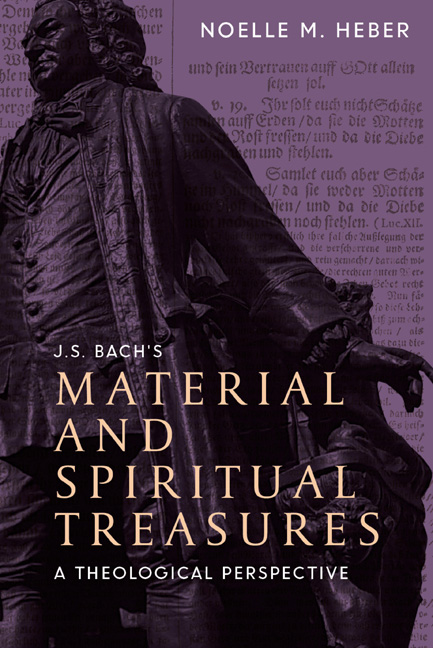Book contents
- Frontmatter
- Dedication
- Contents
- List of Illustrations
- List of Music Examples
- Foreword
- Preface
- List of Abbreviations
- Introduction
- 1 Bach’s Material Treasures: Career, Salary, and Freelancing
- 2 The Servant Prince: Poverty of Christ: Three Days of Christmas (BWV 91, 197a, 248/I, 121, 151)
- 3 Mammon’s Chain: The Destructive and Redemptive Potentials of Material Wealth: Ninth Sunday after Trinity (BWV 105, 94, 168)
- 4 The Afflicted Shall Eat: Tables Are Turned in Eternity: First Sunday after Trinity (BWV 75, 20, 39)
- 5 Spiritual Manna: The Lord Embraces the Poor: Seventh Sunday after Trinity (BWV 186, 187)
- 6 ‘Blood Money’: The Coins that Bought Jesus’ Death: Good Friday (St Matthew Passion)
- 7 Bach’s Spiritual Treasures: Values and Priorities
- Bibliography
- Index of Biblical References
- General Index
5 - Spiritual Manna: The Lord Embraces the Poor: Seventh Sunday after Trinity (BWV 186, 187)
Published online by Cambridge University Press: 27 March 2021
- Frontmatter
- Dedication
- Contents
- List of Illustrations
- List of Music Examples
- Foreword
- Preface
- List of Abbreviations
- Introduction
- 1 Bach’s Material Treasures: Career, Salary, and Freelancing
- 2 The Servant Prince: Poverty of Christ: Three Days of Christmas (BWV 91, 197a, 248/I, 121, 151)
- 3 Mammon’s Chain: The Destructive and Redemptive Potentials of Material Wealth: Ninth Sunday after Trinity (BWV 105, 94, 168)
- 4 The Afflicted Shall Eat: Tables Are Turned in Eternity: First Sunday after Trinity (BWV 75, 20, 39)
- 5 Spiritual Manna: The Lord Embraces the Poor: Seventh Sunday after Trinity (BWV 186, 187)
- 6 ‘Blood Money’: The Coins that Bought Jesus’ Death: Good Friday (St Matthew Passion)
- 7 Bach’s Spiritual Treasures: Values and Priorities
- Bibliography
- Index of Biblical References
- General Index
Summary
Und [Jesus] sprach zu ihnen: Mich jammert des Volcks; denn sie haben nun drey Tage bey mir verharret und haben nichts zu essen.
Markus 8.1b–2THE Bible may include harsh words by Jesus towards those who obtain – and misuse – material abundance, but there is a complementary biblical message for people who experience poverty and oppression. As illustrated in Chapter Two, the Lutheran theological narrative depicts Jesus as a poor, lowly infant, lying as a treasure in the manger and in this way identifying with poor people on earth. As an adult, Jesus instructed his followers on many topics, including poverty and wealth, or ‘treasures in heaven and on earth’. This chapter transitions from the parables of Jesus to one of his specific actions on earth – the miraculous feeding of four thousand people who had followed him into the wilderness to listen to his teachings – and two cantatas based on this account (BWV 186 and 187). The Lutheran interpretation of this story highlights the Lord's care for the physical and spiritual needs of the ‘poor’. Mark 8.1–9 served as the gospel reading for the Seventh Sunday after Trinity and narrates the story as follows:
Mark 8.1–9
At that time, since many people were there and had nothing to eat, Jesus called his disciples to himself, and said to them, I have compassion for the people, because they have now persevered three days with me, and have nothing to eat: and if I send them home without having eaten, they would faint on the way: for a number of them have come from afar. His disciples answered him, whence can we find bread here in the wilderness to feed them? And he asked them, how much bread do you have? They said, seven [loaves]. And he ordered the people to settle themselves on the ground: and he took the seven loaves, and gave thanks, and broke them, and gave them to his disciples to distribute them, and they distributed them to the people. And [they] had a few little fishes: and he gave thanks, and called the same to be distributed. So they ate, and were filled: and they picked up the leftover pieces, [filling] seven baskets. And they were about four thousand [people] who had eaten, and he let them go.
- Type
- Chapter
- Information
- J. S. Bach's Material and Spiritual TreasuresA Theological Perspective, pp. 147 - 176Publisher: Boydell & BrewerPrint publication year: 2021



